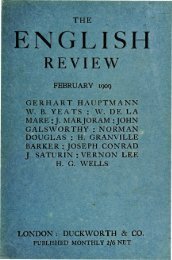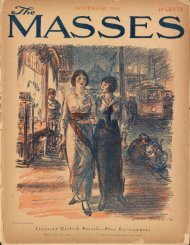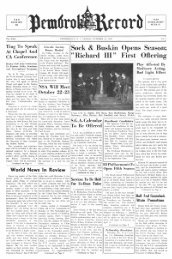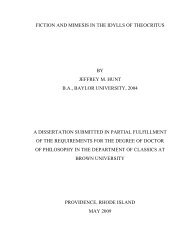View PDF - Brown University Library
View PDF - Brown University Library
View PDF - Brown University Library
- No tags were found...
Create successful ePaper yourself
Turn your PDF publications into a flip-book with our unique Google optimized e-Paper software.
Financial Situation, continued from page 62of the ten or twelve preceding weeks had beenforeshadowing.FORMANFARMMORTGAGES6% July InvestmentBefore selecting your investmentfor the future investigateForman Farm Mortgages andForman Farm Land Bonds.During the past 34 years wehave negotiated over 13,000 individualfarm loans, involvingmore than $34,000,000. Noinvestor has lost a dollar ofprincipal or interest.Because of their record FormanFarm Mortgages are favoredby banks and other institutions.They are availablefor individuals, either for outrightor monthly payment investment.Write for either booklet aboveillustrated and for list of6% July InvestmentsGeorge M Forman & CompanyFARM MORTGAGE BANKERSii South La Salle Street Chicago, 111.GOVERNED as such a market always largelyis by psychological considerations, the approachingtermination of the peace negotiationsand the certainty, according to the financial market'sview from the very first, that GermanyQuestionsThat AreAheadof Uswould sign the treaty, was bound tobe a paramount consideration. Whatwould or might come after that wasdoubtless overlooked—the question ofEurope's condition, even under formalpeace; the question of how the indemnitywould be paid, of how its payment would affectthe financial situation, and of when the world asa whole would have to face the economic reckoningfor the prodigious waste of capital in thewar; the question what outbursts of pent-uppolitical antagonism would occur, and with whatresults, in our own national legislature as inothers."The Duke of Wellington," Talleyrand reportedfrom the Congress of Vienna, when thetreaty to end the wars of a hundred years agowas being framed, "writes of nothing" fromLondon "but conspiracies, secret discontent,stifled complaints, as the vanguard of a comingstorm." It was the perfectly familiar story ofthe rekindling of party animosities which hadonly smouldered while the country was at war,and which now raged all the more violently becauseof their long suppression. What happenedin our own Congress during the three years afterthe defeat of the Confederacy and the end of theCivil War, every one knows. The erratic personalityof Andrew Johnson had much to do withit. But no one conversant with the history ofthe day believes that, if Lincoln had lived out hissecond term, he would have escaped the collisionwith the factions of his own party which, in Johnson'scase, were an inevitable aftermath of warand an inevitable incident of reconstruction.But these are not the considerations which rulethe Stock Exchange.HOW will the payment of the immense indemnitybe financed ? It must be rememberedthat the problem involved is not alone theproblem of raising the money to make an initial20,000,000,000 marks-cash payment within twoyears, or even of providing for interestpayments afterward on theSo,000,000,000 marks or more, coveredby German government bondsdelivered to the Allies. The real problem is thetransfer and distribution of these prodigioussums. "After the experience of the war," aneminent English banker lately declared to theLondon Institute of Bankers, "it would be difficultto set a limit to the amount of revenue whicha government, with the printing-press as an adjunctand the confidence of its people in its solvencyto back it up, might not be able to raise."Financial Situation, continued on page 66When theIndemnityis Paid64










